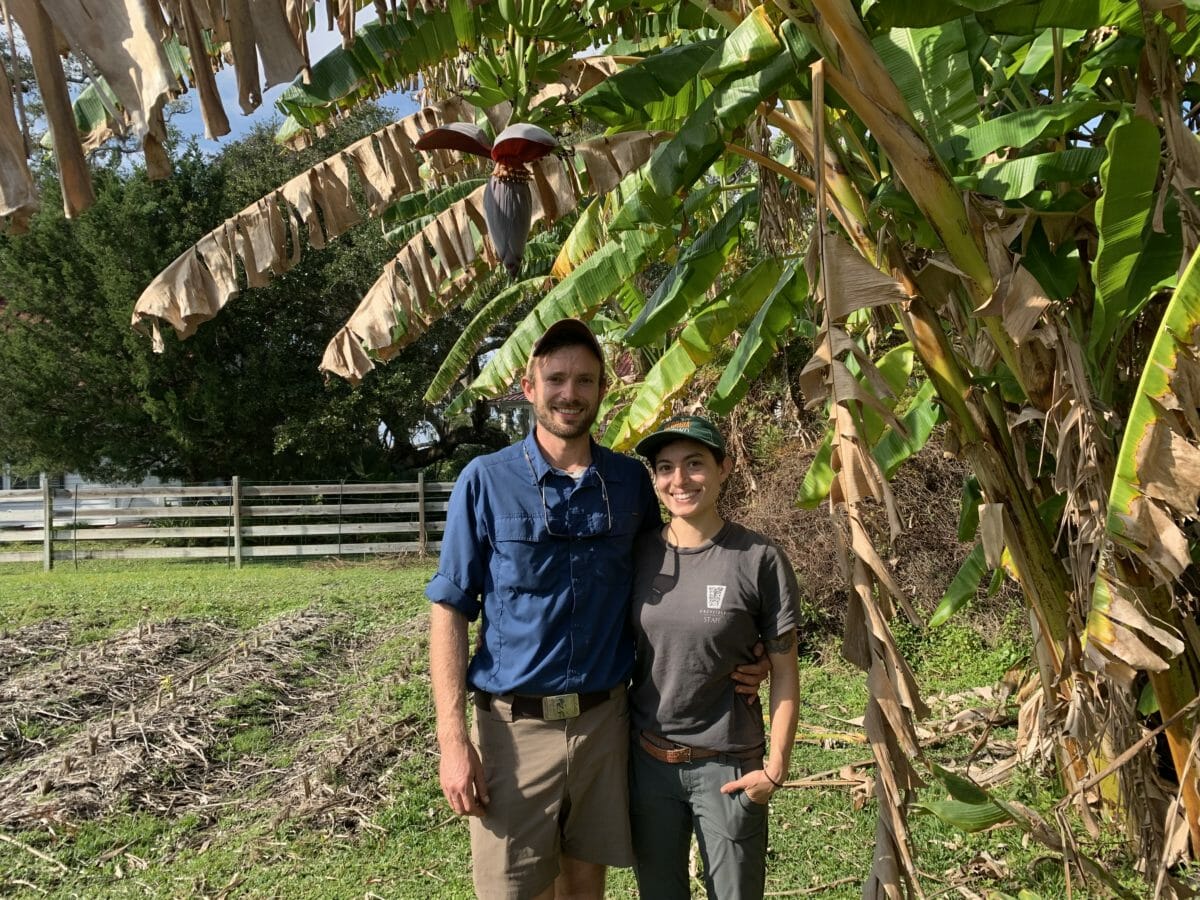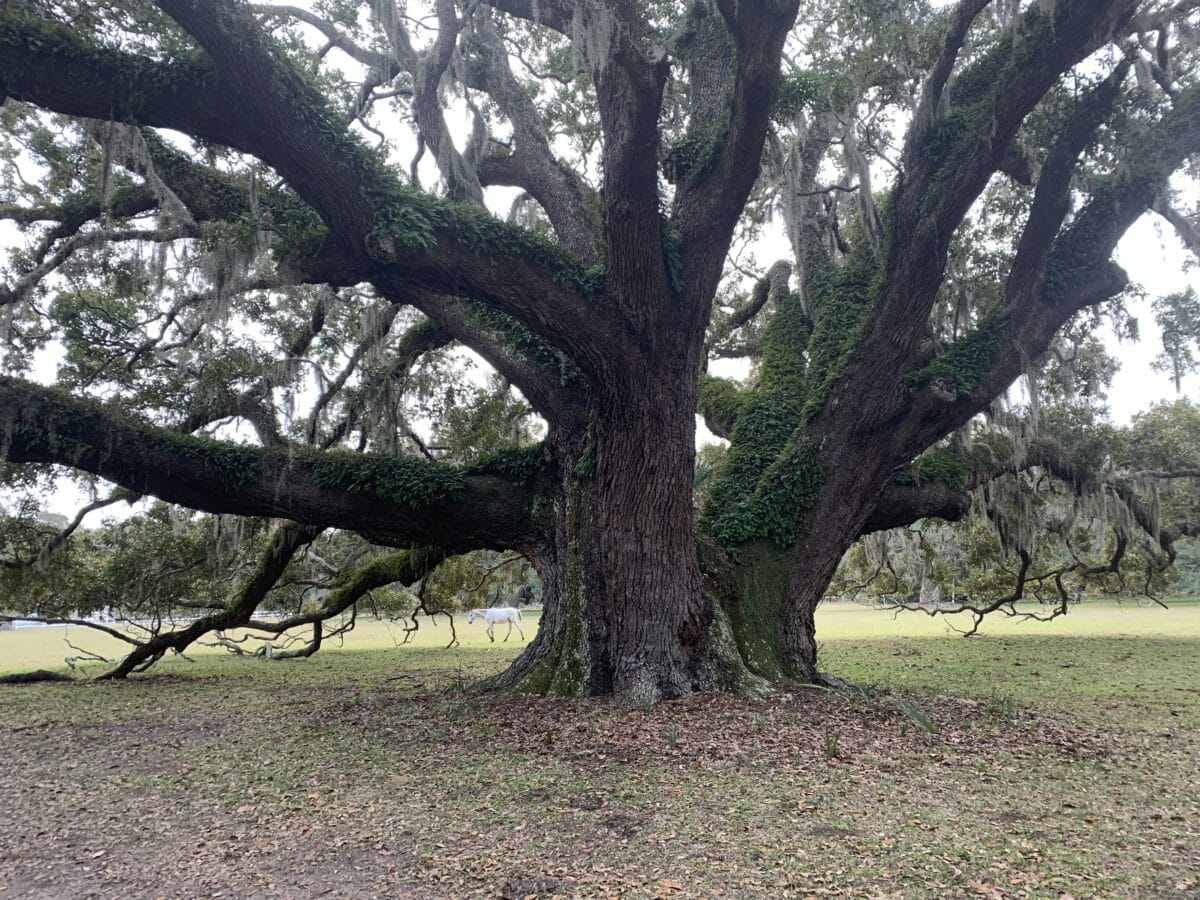These Lucky Farmers Tend a Garden on an Isolated Georgia Island
Monica Ponce and Russell Honderd have a dream job.
These Lucky Farmers Tend a Garden on an Isolated Georgia Island
Monica Ponce and Russell Honderd have a dream job.

Russell Honderd and Monica Ponce stand in front of a planting of Ladyfinger bananas.by Brian Barth
The coast of the southeastern United States is known for its narrow band of barrier islands, places of endless white sand beaches lined with long rows of condos and resorts—Emerald Isle, Hilton Head and St. Simons Island are among the best known. Of the larger islands, only one has been left in more or less its natural state: Cumberland Island, a 17-mile strand off the Georgia coast populated primarily by wild horses and ancient Oaks dripping with Spanish moss.
Cumberland has long been home to a rare breed of human inhabitant as well: the billionaire class. Various Rockefellers and Candlers (Coca-Cola heirs from Atlanta) had winter homes on the island, but the main landowner was the Carnegie family. In the late 19th century, the Carnegies built a 59-room mansion with multiple pools, a golf course and 200 servants. This burned down in the 1950s, and much of the Carnegie land was later turned over to the National Park Service. But their descendants still own a few plots, including the site of Greyfield Inn, a 13-room luxury hotel (the only lodging on the island), where Monica Ponce and Russell Honderd count themselves among the luckiest of small farmers.
The Atlanta couple managed several farms around Georgia before taking the helm of Greyfield’s one-acre garden, which keeps the inn’s decadent restaurant supplied with produce. Their other farming gigs didn’t require a 45-minute boat ride to the nearest post office. And they didn’t come with perks like a salary, a 40-hour work week and benefits—unheard of for upstart organic farmers.
“We used to spend our weekends selling at farmer’s markets. Here we have a built-in market: the kitchen,” says Ponce.
“It’s the best agricultural job in Georgia,” Honderd adds, plucking an orange and slicing it open for me as we wander through the gardens.
I’d come to Cumberland for a mid-winter retreat. The first morning, as I walked from my cottage to the main inn building for breakfast, I passed a small white horse—not a foal, but not quite an adult—ambling through the mist beneath an oak tree with a trunk the diameter of a hot tub, its branches curling down to the ground in a sprawling canopy the size of a three-bedroom home.

I quickly learned that such surreal scenes are the standard backdrop on Cumberland. In summer, giant sea turtles lay their eggs on the beach, the hatchlings emerging by the thousands in the moonlight. Armadillos are found rooting for insects along nearly every trail, with scarcely any concern for hikers passing a few feet away. The horses are just as bold, paying me no attention as they pass me on the island’s sandy paths, on their way to who-knows-what sort of horse business.
The horses are territorial when it comes to others, however, forming herds that the alpha stallions will defend to their death. One herd lives on the land around Greyfield Inn, where the workers have given them names like Bonecrusher and Bandit. Jack, the head of the herd, had a dustup with an insurgent stallion not long before I arrived.
“Jack kicked it in the head and killed it right there in the middle of the lawn,” says Honderd, pointing to the spot. The inn’s well-to-do patrons—rooms start at $625/night, food and private ferry ride included; jacket required for men at dinner—were horrified.
“It’s like Jurassic Park out here,” Ponce adds, pointing to a marshy spot a couple of hundred feet away where she informs me two alligators reside.
The inn, which is still owned by Carnegie descendants, was once known as a stuffy place where old-money southerners go—the décor is still heavy on taxidermy—but it’s recently become a bit more hip, thanks largely to Whitney Otawka, the tattooed young chef who took over the dining program in 2015. Otawka, who trained with Hugh Acheson at Five & Ten in Athens, Georgia, and later rose to notoriety as a Top Chef contestant, recently published The Saltwater Table, a cookbook themed on the island-to-table cuisine for which she’s become famous.
Otawka incorporates lemongrass, coconut milk and Caribbean spices in her food, along with local sheepshead fish and celery microgreens, which I nibble for the first time as Ponce and Honderd walk me through their greenhouse. The warm winter sun soothes my Toronto snow-weary bones. What an idyllic life, I tell them. But that’s not necessarily the case when you work outside year-round, they tell me. Winter is lovely, but by March, the sand gnats come out. Then come the ticks that cling to each other by the thousands in little writhing balls, waiting for you to pass on the trail. By mid-spring, the mosquito swarms have set in.
“And then, once it hits 90 degrees, you start getting the big mosquitoes that can bite through jeans. Then the biting flies come,” says Honderd. “You can almost tell the temperature by what’s trying to suck your blood.” Paradise is forever fleeting.
Follow us
This work is licensed under a Creative Commons Attribution-NoDerivatives 4.0 International License.
Want to republish a Modern Farmer story?
We are happy for Modern Farmer stories to be shared, and encourage you to republish our articles for your audience. When doing so, we ask that you follow these guidelines:
Please credit us and our writers
For the author byline, please use “Author Name, Modern Farmer.” At the top of our stories, if on the web, please include this text and link: “This story was originally published by Modern Farmer.”
Please make sure to include a link back to either our home page or the article URL.
At the bottom of the story, please include the following text:
“Modern Farmer is a nonprofit initiative dedicated to raising awareness and catalyzing action at the intersection of food, agriculture, and society. Read more at <link>Modern Farmer</link>.”
Use our widget
We’d like to be able to track our stories, so we ask that if you republish our content, you do so using our widget (located on the left hand side of the article). The HTML code has a built-in tracker that tells us the data and domain where the story was published, as well as view counts.
Check the image requirements
It’s your responsibility to confirm you're licensed to republish images in our articles. Some images, such as those from commercial providers, don't allow their images to be republished without permission or payment. Copyright terms are generally listed in the image caption and attribution. You are welcome to omit our images or substitute with your own. Charts and interactive graphics follow the same rules.
Don’t change too much. Or, ask us first.
Articles must be republished in their entirety. It’s okay to change references to time (“today” to “yesterday”) or location (“Iowa City, IA” to “here”). But please keep everything else the same.
If you feel strongly that a more material edit needs to be made, get in touch with us at [email protected]. We’re happy to discuss it with the original author, but we must have prior approval for changes before publication.
Special cases
Extracts. You may run the first few lines or paragraphs of the article and then say: “Read the full article at Modern Farmer” with a link back to the original article.
Quotes. You may quote authors provided you include a link back to the article URL.
Translations. These require writer approval. To inquire about translation of a Modern Farmer article, contact us at [email protected]
Signed consent / copyright release forms. These are not required, provided you are following these guidelines.
Print. Articles can be republished in print under these same rules, with the exception that you do not need to include the links.
Tag us
When sharing the story on social media, please tag us using the following: - Twitter (@ModFarm) - Facebook (@ModernFarmerMedia) - Instagram (@modfarm)
Use our content respectfully
Modern Farmer is a nonprofit and as such we share our content for free and in good faith in order to reach new audiences. Respectfully,
No selling ads against our stories. It’s okay to put our stories on pages with ads.
Don’t republish our material wholesale, or automatically; you need to select stories to be republished individually.
You have no rights to sell, license, syndicate, or otherwise represent yourself as the authorized owner of our material to any third parties. This means that you cannot actively publish or submit our work for syndication to third party platforms or apps like Apple News or Google News. We understand that publishers cannot fully control when certain third parties automatically summarize or crawl content from publishers’ own sites.
Keep in touch
We want to hear from you if you love Modern Farmer content, have a collaboration idea, or anything else to share. As a nonprofit outlet, we work in service of our community and are always open to comments, feedback, and ideas. Contact us at [email protected].by Brian Barth, Modern Farmer
April 13, 2020
Modern Farmer Weekly
Solutions Hub
Innovations, ideas and inspiration. Actionable solutions for a resilient food system.
ExploreExplore other topics
Share With Us
We want to hear from Modern Farmer readers who have thoughtful commentary, actionable solutions, or helpful ideas to share.
SubmitNecessary cookies are absolutely essential for the website to function properly. This category only includes cookies that ensures basic functionalities and security features of the website. These cookies do not store any personal information.
Any cookies that may not be particularly necessary for the website to function and are used specifically to collect user personal data via analytics, ads, other embedded contents are termed as non-necessary cookies.
Would love to learn more of their story 🙂
Wonderful story!